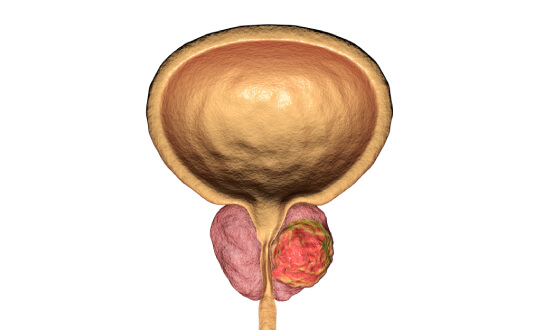Prostate adenoma or benign prostatic hyperplasia (BPH), is a noncancerous increase of the prostate gland and leads to deterioration of life quality in men. Drug therapy is effective in a limited number of patients at the early stages of the disease. In other cases, preference is given to surgical techniques. According to the American Urological Association, TURP is the most common and preferred surgical treatment for BPH.
Content
- Indications for transurethral resection in BPH
- Preparation for transurethral resection of the prostate
- The risks of transurethral resection of the prostate
- Transurethral resection of the prostate technique
- The postoperative period
- Organization of medical treatment in leading German urological centers
Indications for transurethral resection in BPH
The purpose of transurethral resection in patients with prostate adenoma is to restore normal urination and prevent genitourinary system complications. Particularly, TURP is carried out in the presence of the following symptoms:
- frequent urination, urinary urgency;
- nocturnal enuresis (in excluded diabetes mellitus);
- weak or intermittent urine stream;
- difficult and slow urination;
- difficulties in starting urination, the need to strain pelvic floor muscles;
- feeling of incomplete bladder emptying;
- prostate bleedings.
Due to the restoration of normal urination, TURP prevents secondary lesions of the kidneys, the formation of calculi in the kidneys and bladder, and frequent and recurrent urinary tract infections.
Preparation for transurethral resection of the prostate
Preparation for TURP in Germany significantly reduces surgical risks and facilitates the postoperative period. A few weeks before the intervention, you will undergo a complete physical examination and, if necessary, receive recommendations for the compensation of diabetes mellitus, normalization of blood pressure level, improvement of the external respiration function, etc. The doctor will also recommend you to stop smoking.
A few days before the intervention, it is necessary to cancel the intake of drugs such as:
- anticoagulants and antiplatelet drugs (for example, clopidogrel and warfarin);
- nonsteroidal anti-inflammatory drugs (for example, aspirin, ibuprofen, and naproxen);
- vitamin E.
A broad-spectrum antibiotic is additionally prescribed for the prevention of urinary tract infections.
Life during the first few days after a patient’s discharge from the hospital is also worth planning in advance. For instance, you will not be able to drive a vehicle and get home by car on your own.
The risks of transurethral resection of the prostate
Like any surgical intervention, a transurethral resection of the prostate gland has certain surgical risks. The physician will discuss with you in advance, the following possible risks and the methods of their prevention:
- Temporary difficulties of urination. During the first few days after surgery, you will urinate via a catheter.
- Dry orgasm. After prostate surgeries, the direction of sperm movement during ejaculation changes. The sperm enters the bladder retrogradely. This factor does not affect the ability to achieve orgasm, but it becomes an obstacle when planning pregnancy.
- Erectile dysfunction, which occurs due to the injuries of nerve endings.
- Low sodium concentration in the blood or TUR syndrome. During the TURP, the surgical area is washed with a large amount of fluid, which is partially absorbed into the systemic circulation. This leads to impaired blood electrolyte levels and could potentially be a life-threatening condition. When using bipolar resectoscopes, the risk of this complication is excluded.
- Need for repeated treatment due to a further increase in the prostate gland size or urethral stricture (narrowing).
The surgical risks of transurethral resection in Germany are minimal. The work of German hospitals is characterized by a low percentage of complications and a high percentage of successful interventions.
Transurethral resection of the prostate technique
TURP is carried out on an inpatient basis, under general or spinal anesthesia. After anesthesia completion, the resectoscope is inserted into the urethra. A resectoscope is a thin metal tube with a light source, a camera, and a wire loop (similar to a scalpel). Due to its miniature size, the equipment is placed in the urethra without additional incisions.
The resectoscope moves up the urethra and reaches the enlarged prostate. After that, an electric current is passed through its loop. Due to this, the loop acquires the ability to cut off small pieces of prostate tissue. The removed tissues are washed off into the bladder and remain there until the procedure is complete. Simultaneously with the prostate resection, an electrocoagulation of blood vessels is carried out. An electric current "closes" the blood vessels and stimulates blood clotting. Due to this, reliable hemostasis is provided during the procedure and the risks of intraoperative and delayed hemorrhages are minimal.
In Germany, a transurethral resection is performed with the help of bipolar resectoscopes. This means that the electric current does not pass through the patient's body or injure the surrounding healthy tissues, as in the case of using monopolar equipment. In bipolar resectoscopes, both electrodes are located on the loop of the device, so the current affects only the resected areas of the prostate. In addition, when using bipolar systems, TURP can be performed in patients with implanted pacemakers.
The procedure takes somewhere between 90 minutes and 2 hours. In addition to minimal invasiveness and quick relief of symptoms, TURP has a number of benefits for urology specialists and patients:
- direct access to the prostate;
- excellent imaging with an endoscopic camera, which can be combined with ultrasound guidance;
- it is carried out on any degree of prostate enlargement, any volume of gland can be removed during one procedure;
- it can be carried out simultaneously with other operations, for example, with the removal of small calculi from the bladder;
- the effectiveness of the procedure and absence of long-term complications has been confirmed in clinical trials;
- it is extensively used in clinical practice, specialists have rich relevant experience.
The postoperative period
Treatment of benign prostatic hyperplasia in Germany does not come to an end when a patient is discharged from the hospital. Each man receives detailed recommendations for care during the postoperative period and also, follow-up monitoring.
First of all, the patient needs to drink enough water for active urination and to flush out blood residues from the bladder. This serves as an additional prevention of urinary tract infections and restores the natural urinary reflex. For the same purpose, it is recommended to exclude dehydration medications (for example, antihistamines) and substances that affect the renal vessels (for example, alcohol, caffeine, and nicotine). If necessary, you can take painkillers.
A patient does not need to keep to a special diet, but preference should be given to food rich in cellulose and dietary fibers (this normalizes defecation and prevents constipation). For a few weeks after discharge, it is recommended to avoid prolonged and hard physical work and sexual intercourse.
In general, the symptoms of prostate adenoma gradually disappear within 2-8 weeks after surgery. You will feel significant relief immediately after the removal of the urinary catheter.
Organization of medical treatment in leading German urological centers
The leading German urological centers admit German citizens and international patients. If you do not have experience receiving treatment in foreign clinics or you want to be sure that your medical program is organized thoroughly, you can use the services of Booking Health. Booking Health is the official partner of leading German clinics and a provider of treatment in Germany for patients from 75 different countries.
The specialists at Booking Health will help you with important issues, such as:
- selection of the right hospital, based on the annual qualification profile;
- establishment of direct communication with your physician;
- preparation of a medical program in advance, without repeating previous examinations;
- provision of favorable costs for surgery, without overpricing and additional coefficients for foreign patients (saving up to 50%);
- booking the appointment with a doctor on the necessary date;
- monitoring of the medical program at all its stages;
- assistance with buying and forwarding medicines;
- communication with the hospital after the treatment’s completion;
- control of invoices and return of unspent funds;
- organization of additional examinations;
- top-class service: booking hotels and plane tickets and transfer organization.
Please leave a request with a description of your medical problem and your contact information on the Booking Health website, and wait for a call from a specialist of our company within 24 hours.
Choose treatment abroad and you will for sure get the best results!
Authors:
This article was edited by medical experts, board-certified doctors Dr. Nadezhda Ivanisova, and Dr. Bohdan Mykhalniuk. For the treatment of the conditions referred to in the article, you must consult a doctor; the information in the article is not intended for self-medication!
Our editorial policy, which details our commitment to accuracy and transparency, is available here. Click this link to review our policies.
Sources:
Centers for Disease Control and Prevention
Read:
Why Booking Health - questions and answers
How to make right decision when choosing the clinic and specialist
7 reasons to trust to the rating of clinics on the Booking Health portal
Don't know where to start?
Contact Booking Health







